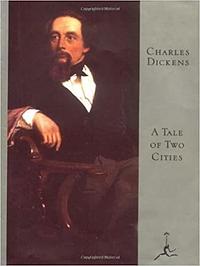Take a photo of a barcode or cover
I was peer pressured into reading this by Tessa Grey and Will Herondale. So far... it’s not great.
Going to try this one again at a later time.
Going to try this one again at a later time.
Kανενας δεν εχει καταφερει να αποδοσει την ατμοσφαιρα της Γαλλικης επαναστασης με τοσο γλαφυρο τροπο. Ουτε καν ο Ουγκο. Παιρνοντας την ιστορια απο τρεις πλευρες (των επαναστατων, των αριστοκρατων, και των Αγγλων), μελετωντας προσεκτηκα το βιβλιο του Καρλαϊλ για την ιστορια της επαναστασης, ο Ντικενς καταφερνει να μας δωσει μια υπεροχη διηγηση του πως λειτουργουσαν τα πραγματα στο επαναστατημενο Παρισι και πως ηταν η καθημερινη ζωη των κατοικων που ανηκαν στα δυο στρατοπεδα. Το βιβλιο προσπαθει να κρατησει ισες αποστασεις μεταξυ επαναστατων και αριστοκρατων, ηρωων και αντι-ηρωων, Αγγλων και Γαλλων. Θα ελεγα πως μοχθει για να μας πεισει οτι θα ειναι εντελως δικαιο και δεν θα αδικησει ή κολακεψει καμια πλευρα.
Αλλα το ταλεντo του Ντικενς κανει την ιστορια και την πολιτικη πισω απο το βιβλίο τελειως αδιαφορα. Η πρωτη παραγραφος, η τελευταια παραγραφος, ο διαλογος του γιατρου Μονετ και του Λορρυ, η σκηνη της κυριας Κρος και της κυριας Ντεφραζ, και ποσα ακομα που δεν αναφερω, κανουν αδειαφορο ολο το υποβαθρο πανω στο οποιο χτιστηκε αυτο το αριστουργημα.
Αλλα το ταλεντo του Ντικενς κανει την ιστορια και την πολιτικη πισω απο το βιβλίο τελειως αδιαφορα. Η πρωτη παραγραφος, η τελευταια παραγραφος, ο διαλογος του γιατρου Μονετ και του Λορρυ, η σκηνη της κυριας Κρος και της κυριας Ντεφραζ, και ποσα ακομα που δεν αναφερω, κανουν αδειαφορο ολο το υποβαθρο πανω στο οποιο χτιστηκε αυτο το αριστουργημα.
adventurous
challenging
hopeful
inspiring
slow-paced
Bring back LA GUILLOTINE!!!!
I read this book in 8th grade. I liked it then.
Probably due for a reread now.
Honestly, I don't get the Dickens hatred. He's good at what he does. *shrug*
Probably due for a reread now.
Honestly, I don't get the Dickens hatred. He's good at what he does. *shrug*
Such a beautiful ending.
Of all of Dickens' virtues as a writer, perhaps my favorite is this: he has no contempt for any of his characters - even those most apparently deserving of it.
Of all of Dickens' virtues as a writer, perhaps my favorite is this: he has no contempt for any of his characters - even those most apparently deserving of it.
Of the classics, this is one of my favorites. It is a truly beautiful story and one that you want to read all the way to end.
I think this book had a great story line, but was extremely hard to follow. I had to deeply read every page then go onto spark notes to understand what it was I read. By the end, the book made sense and was very good, but while I was reading it felt more like work then pleasure.
challenging
dark
emotional
hopeful
inspiring
sad
tense
medium-paced
Plot or Character Driven:
A mix
Strong character development:
Yes
Loveable characters:
Yes
Diverse cast of characters:
No
Flaws of characters a main focus:
Complicated
dark
informative
reflective
sad
tense
slow-paced
Plot or Character Driven:
A mix
Strong character development:
Yes
Loveable characters:
Complicated
Diverse cast of characters:
Complicated
Flaws of characters a main focus:
Yes
Reading A Tale of Two Cities makes me regret not taking a course on Victorian literature in college. I'd imagined that Victorian novels would be long, dreary reads but my course of Dickens has been working out marvellously to date. The narrative in a Tale of Two Cities is gripping, particularly those parts of the novel that describe the misery of the peasantry and urban poor, and their ultimate revenge. Oliver Twist and Great Expectations were both page turners but of the two, I'd liked Oliver Twist better, finding Great Expectations a tad over the top at times (Ms Havisham, Pip's inexplicable obssession with Estella, the whole Magwitch affair). In a Tale of Two Cities, while there were still plot twists and drama aplenty, I felt that Dickens managed to keep a firm hand on things, not letting himself go overboard. Finally, I loved how the novel shifted easily between pure narrative and the symbolic (e.g. when describing the murder of the Marquis Evremonde).




